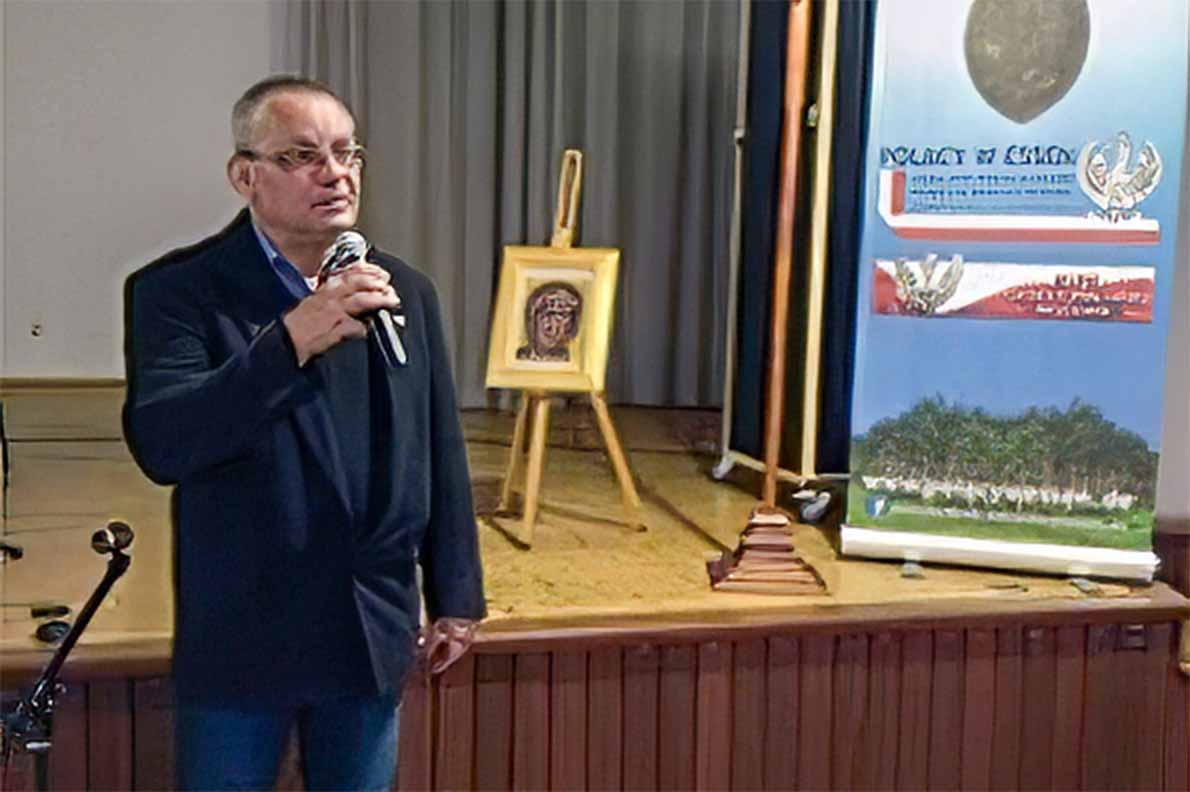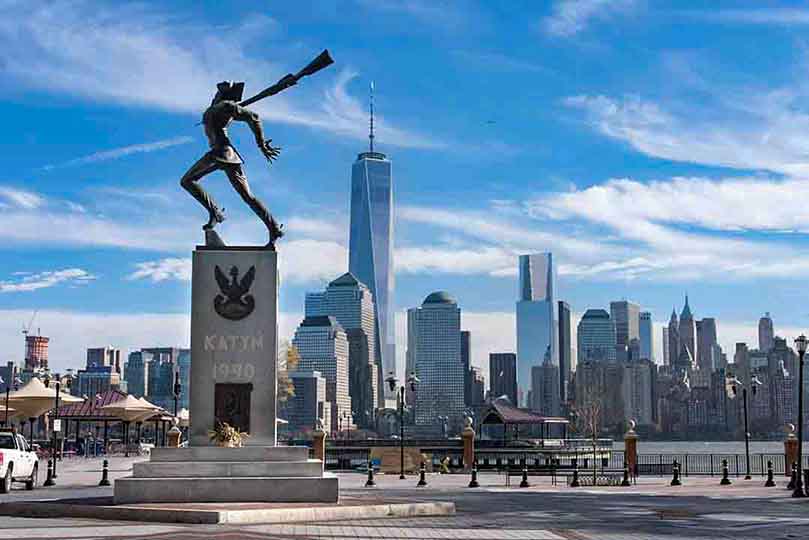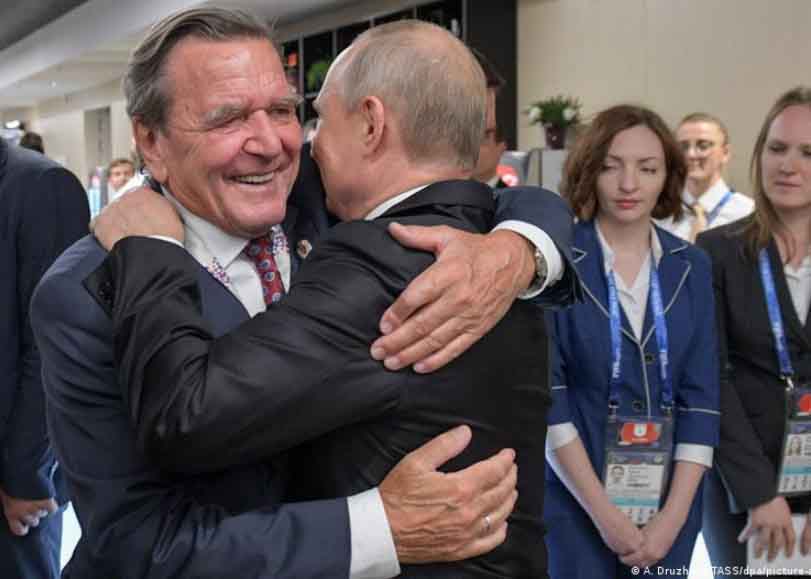Who controls the past controls the future
— George Orwell, "1984"
Why rewrite history?
"We see attempts to rewrite history — as the needs of the temporary political situation dictate" — Putin on August 31, 2009. These words were spoken on the eve of the 70th anniversary of the outbreak of World War II.
Many Polish journalists, including Jerzy Marek Nowakowski, the former Polish ambassador to Latvia and Armenia, claim that Putin, writing history anew, aims to recreate the Russian Empire within the borders of 1793. Such a perspective cannot be ruled out. The explanation for this may be the current policy of the President of the Russian Federation, supported by the Russian world of science, culture and politicians devoted to him.
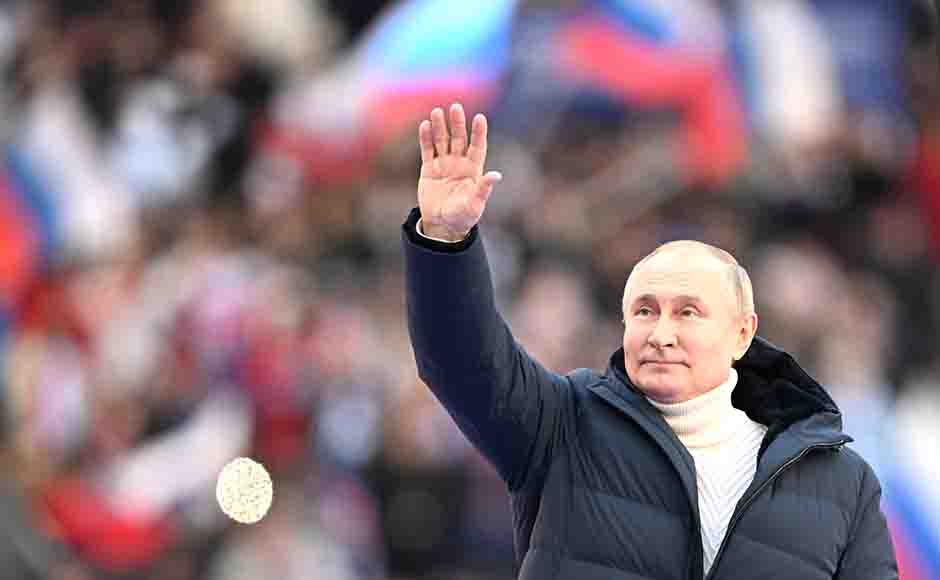
Putin at the Luzhniki Stadium in 2022 (Source: Wikipedia)
During the presidency of Vladimir Putin, Mikhail Pokrovsky's formula that "history is a policy made backwards" became in practice the motto of the Russian authorities. The sources of Russia's modern historical propaganda should be sought indirectly in the crisis of the 1990s, and directly in 2004.
With the collapse of the USSR, Russia lost its global power status. In the face of the ubiquitous economic and structural problems of today's Russia, the myth of the "great patriotic war" plays a huge role, and the history of the victory over Hitler is a key factor, uniting Russians around the common heritage sanctified by the blood of millions. This myth is useful mainly within the country, but it is also a useful tool in foreign policy. Putin's point is that, by emphasizing the joint victory over the Third Reich with the West, the Western leaders get the impression that cooperation with Russia is possible and can bring real fruits.
How to write "The New History of Russia?"
To appeal to the glories of fighters in the patriotic war, to convince the people about the need to remain in military readiness, to hide the facts, or to distort the facts. It should be emphasized that the studies of Russian scientists, newly established television stations (primarily the global English-language Russia Today) and school textbooks in Russia have one goal: to educate the society in a military-patriotic spirit, to convince them that it is necessary to fight "those in the West, who are trying to disregard Russian victories and the potential of Russia's presidency over Central and Eastern Europe”.
The Kremlin creates its own narrative about the development of history. They paint themselves in a radiant glow. Russia has always won "brilliant" military victories over invaders from the West, be it the Crusaders, Napoleon's army, or the Wehrmacht of Nazi Germany. The "Great Patriotic War", i.e. World War II, is treated as a prime example of the dangers looming from the West, and at the same time invoked as evidence of patriotism and the readiness of the population to sacrifice and the need to remain in constant military readiness.
June 22, 2021, in the German daily "Die Zeit," in the article entitled "Russia wants partnership, tension is the fault of the West," Putin emphasized his pride in the courage of Red Army soldiers and workers "who defended not only the independence and dignity of their homeland, but also saved Europe and the whole world from enslavement." Here he expressed his admiration for Stalin, who, in his opinion, is considered a wise military leader and statesman. The article ignores the horrors of the Soviet occupation of Poland and the Baltic States and the aggressive war against Finland from September 1939 to June 1941. The imposition of Soviet power in Poland and the Baltic states after 1944 is presented as "liberation". In the above-mentioned article, he blames Europe and the USA for unleashing a conflict in Ukraine, and he calls the Russian annexation of Crimea in 2014 "the withdrawal" of Crimea from the Ukrainian state.
In rewriting history, Putin and his associates return to the "roots" of Russia. In order to rebuild the former empire and superpower, the Russian authorities are identified with the Church and the cult of personality is proclaimed. Nowadays, Putin is often seen together with his ally Cyril, the Patriarch of Moscow and All Russia. Let's take the opportunity to mention that the patriarch has several luxurious mansions, a yacht for $ 4 million, a private jet, a collection of sports cars and limousines, a special Byzantine train at his disposal." In this "return to the roots", it is helpful to carefully commemorate the communist leaders, for example, by establishing a new Stalin museum in Tver, where some exhibitions are named: "The role of Stalin in the revival of the Russian Orthodox Church," and "Stalin as a symbol of Soviet successes and victories."
Poland — Under Attack
The Polish thread is very strong in Putin's propaganda: It is the conflict with Poland that lies at the root of contemporary historical propaganda in Russia. Before 2019 (the anniversary of the outbreak of World War II), Russia launched a new media campaign with a dominant anti-Polish angle, trying to forestall the wave of international discussions about the Soviet Union's shared responsibility for the outbreak of World War II. The topic of relativizing the guilt of the NKVD for the massacre of Polish officers in 1940 and diminishing the importance of the Polish military in 1939-1945 has been sounding very strongly. During the meeting with the leaders of the Eurasian Economic Union in Saint Petersburg (2019), the Russian president read out unspecified documents about the events of 1938–1939, emphasizing the role of the Munich Agreement and insinuating that the partition of Czechoslovakia was also Poland's fault.
The Ministry of Defense of the Russian Federation published a text on its official website in which Poland is held responsible for unleashing World War II. This text appeared in 2009 in the "Military Encyclopedia" section, in the "History - against lies and forgery" section. Its author is Colonel Sergey N. Kovalov from the Military History Institute of the Ministry of Defense of the Russian Federation. Kovalov writes: “All those who have studied the history of World War II impartially know that it began because of Poland's refusal to meet German claims. However, what Adolf Hitler wanted from Warsaw is less known. "
The Kremlin launched a more intensive historical campaign against Poland, especially since 2009. This propaganda offensive was partly a reaction to Warsaw's attitude towards the Russian invasion of Georgia in August 2008 (President Lech Kaczyński visited Georgia), and partly to the progress in the implementation of the strategy to diversify the supply of energy resources for Poland.
Representatives of the Russian state actively participated in the anti-Polish campaign in 2009, just like five years earlier. The attack was aimed at the Polish state openly opposing Russia's aggressive policy in the region and speaking loudly about the real role of the USSR in World War II; also for the Three Seas Initiative, energy diversification, strengthening cooperation with the US in the region and active participation in strengthening NATO's eastern flank. These actions do not arouse particular enthusiasm in Moscow, where exactly the opposite direction is desired. The recent reactions from the European Commission against the so-called lack of the rule of law in Poland have given Putin even more courage to attack us.
It is known that Russia has perfectly mastered information warfare techniques that require constant vigilance in the adversary, and its lies may relate to issues that have so far seemed obvious and indisputable. However, it turns out that Poland is not defenseless and can effectively respond to hostile disinformation. Thanks to the resolute response of the Polish government and activity in key media around the world, the "creator of Russia's new history" failed to convince the public about who was responsible for the hecatomb of World War II. Particularly important is the uniform reaction of allied states within NATO and the EU, which clearly sided with Poland. And despite that Russia has decades of experience and a professional apparatus built to spread propaganda to create friendly narratives and divide its opponents — it has failed to achieve its goal.
A few examples of the "new history of Russia"
Russia and Ukraine. Putin treats historical policy as one of the main tools of foreign policy. He refers to Russian historiography founding it on the statements that the areas of modern Ukraine should be treated as the historical territories of the Russian state. Putin refers to a theory that dominated the Russian Empire since the 19th century during the reign of Tsar Nicholas II.
In an article from July 12, 2021, Putin announced that the lands of Ukraine and Russia are a common historical and spiritual space. He used the concept of the tripartite Russian nation. Its assumption is that the Russian nation is made up of Greater-Russians (Russians), Belarusians, and Lesser-Russians (Ukrainians); these components may differ ethnographically, but they share a commonality of religion, language and political interests. Putin points out: "modern Ukraine was entirely created by Russia, and more precisely by Bolshevik, communist Russia" and argues that modern Ukrainian statehood begins with the Ukrainian Soviet Socialist Republic.
He describes the events in Ukraine in 2014 as a "coup d'état", supported by Europe and the United States, and writes about the "return" of Crimea to Russia. The direct effects of imposing such a historical narrative became apparent from the moment of the capture of Donbas, Lugansk and the appropriation of Crimea. Russia recognized the separatist republics in Ukraine and entered Ukraine. Blood is being spilled there today...
About the Molotov-Ribbentrop Pact
Statement by Vladimir Putin on February 22, 2005 for the Slovak media, preceding the Russia-US summit in Bratislava. The Russian leader, asked, among others, for an evaluation of the Soviet-German treaty of August 23, 1939, stated: “Please go back to the events of September 1938, when the famous agreement between Nazi Germany and Western European states was signed in Munich, later referred to as the Munich conspiracy. (...) The Soviet-German document was signed at a much lower level — at the level of foreign ministers — after a year, in response to (...) the Munich conspiracy. (...) The Soviet Union decided to sign the Molotov-Ribbentrop pact with Germany to secure its interests and ensure its security on the western frontiers."
August 31, 2009, Warsaw (PAP / Media) — Putin said: "The Ribbentrop-Molotov Pact of August 1939 can be condemned" with full justification", but the USSR decided to sign it because it was left "alone" against Germany, possible allies had already signed a similar agreement with the Third Reich" (...) "The pact "was objectively necessary - it was a historically justified act of essence to the state".
In the history textbook for secondary schools, presented in 2016, entitled "Germany-Russia. Mutual History Stops - Places of Remembrance ", the Russian historian Alexander Chubaryan "pushed" the following opinion on the pact: "Stalin found himself in a hopeless situation in 1939 and was forced to conclude a pact with Hitler." Chubaryan did not agree with and even condemned the attempts to equalize the actions of Nazi Germany and the USSR.
On the victory of the USSR in World War II
The reason for Moscow to co-decide on the international order today is supposed to be "the decisive contribution of the USSR to the victory over the Third Reich in 1945." The contrast between the myth of the Red Army's heroic victory over fascist Germany and the real causes and course of World War II is a problem for Russia. By emphasizing on every occasion (especially during the May 9 parades) this "extreme heroism", the Kremlin seeks to seize the opportunity to integrate society around its goals and to improve its depressed mood.
In the American magazine "The National Interest" there is a historical article about the beginning of World War II in which Putin objected to the idea that the Hitler-Stalin pact of August 1939 contributed to the outbreak of the war.
In early June 2009, an article by Col. Sergey Kovalev from the Institute of War History of the Ministry of Defense of the Russian Federation entitled "Inventions and falsification of the assessment of the role of the Soviet Union before and at the beginning of World War II." It is devoted to Poland's responsibility for unleashing the war in 1939. Kovalev, as the main argument for the outbreak of the war, cites Warsaw's refusal to the "moderate claims" of the Third Reich: the incorporation of Gdańsk into Germany, and the construction of an extraterritorial highway to East Prussia.
In the television program "Weekly News" (rus. Вести Недели), aired on the eve of the 68th anniversary of the outbreak of World War II, the thesis appeared that in the 1930s Poland intended to form a political alliance against the USSR with Nazi Germany and Japan. According to the Russian station, before the outbreak of World War II, Poland was among Hitler's political allies and planned an attack on the USSR with him!
About the Battle of Grunwald
The Minister of Culture of the Russian Federation and the chairman of the Russian Military Historical Society, Wladimir Medinski, stated that the Russians, not the Poles and the Lithuanians, had won the Battle of Grundwald. A note was published on the Society's website entitled "Grunwald battle. July 15, 1914, a memorable date of Russia's military history (...). On that day, Russian troops and their allies. Lithuanians, Czechs and Poles won the victory over the German knights."
About NATO
The North Atlantic Alliance Putin describes as a relic of the Cold War. He explains that "the root cause of the growing mutual distrust in Europe was the military alliance's shift to the east, which, moreover, began with the effective persuasion of the Soviet leadership to agree to the accession of a united Germany to NATO. The verbal assurances of the time, such as "This is not directed against you" or "The boundaries of the block will not come close to you", were forgotten too quickly. The precedent has been set. Thus, there have been several more 'waves' of NATO enlargement since 1999,' Putin laments.
Russian cinematography in the service of propaganda
The films "1612", "Taras Bulba", "Smiersz" and "Secret Agent's Happiness" build a one-dimensional picture of the past, based on the manipulation of historical facts, or on fiction. Such film productions are intended to supplement historical knowledge, and in practice, they can have the greatest impact on the awareness of Russian citizens. It is through the films that the historical roles of "victims" and "executioners" are exposed in a way completely detached from the truth and ignoring the latest scientific research. Russian film productions in the genre of historical cinema enjoy financial support from state institutions and oligarchs who are seeking the favor of the authorities.
Russian historical propaganda is conducted with extensive use of disinformation techniques. In practice, it is implemented through thematic campaigns and with extensive use of Russian (and selected Western) mass media, including the Internet. Representatives of the state administration, scientists-historians from the Russian Academy of Sciences, and people of culture of the Russian Federation actively participate in it.
The last three moves by the Russian Federation's authorities to institutionalize Russian historical propaganda were: the proposed textbook changes, the establishment of the Commission for Counteracting Attempts to Falsify History to the Detriment of the Russian Federation's Interests, and the establishment of the National Unity Day, celebrated on November 4 (instead of the October Revolution).
In textbooks for schools, a new "interpretation" of the history of the Russian Empire whose tradition was continued by none other than Joseph Stalin is promoted (implicitly: this role is now played by President Putin). For Russian students, the textbooks hint that the Russian state must be a superpower and must be governed by a strong ruler. Thus, tsarist Russia is identified with the USSR — these are the two forms of the empire's existence and survival.
Particular emphasis in the upbringing of the "new citizen of Russia" was placed on the subject of history. Putin expressed his conviction that teaching history should only expose facts that will develop a feeling of pride in one's own country. At this point, one should not forget the infamous attitude towards this role of history textbooks, presented by the Nobel Peace Prize winner, Professor Andrei Sakharov, when Putin met with scientists from the Institute of Russian History of the Russian Academy of Sciences (RAN) in 2002. Professor Sakharov became the institute head. He was also the author, editor and reviewer of history textbooks for students. The Nobel laureate-Sakharov said at this meeting: "the stabilization of a great country is always connected with the person of a wise leader."
In December 2007, the Ministry of Education approved a new school textbook on the history of Russia 1945-2007 edited by Alexander Filippov, which positively assessed Stalinism and glorified the undemocratic concept of Vladimir Putin's rule. In August 2008, teachers were presented with the guidelines for the textbook on the history of Russia 1900-1945 by the same author. This handbook justifies Stalinist ethnic cleansing, the Katyn massacre is counterbalanced by the "terrible fate" of the Red Army soldiers in Polish POW camps in 1920.
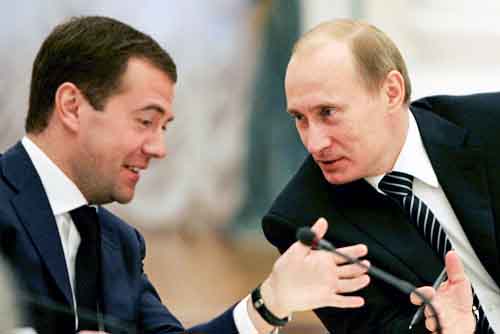
Vladimir Putin and Dmitri Medvedev (Source: Wikipedia)
In May 2009, President D. Medvedev appointed a Commission for Counteracting Attempts to Falsify History to the Detriment of the Interests of the Russian Federation. The 28-person group headed by the head of the presidential administration, Sergei Naryshkin, included representatives of the Ministry of Defense, the Federal Security Service, the State Duma, the Russian Academy of Sciences, non-governmental organizations and journalists. Representatives of both conservative (eg Natalia Narochnickaya) and democratic (Nikolai Swanidze) circles are represented in the Commission.
The name of Natalia Narochnicka deserves a special comment here because of the damage it has caused to the true interpretation of history, and because it is the strongest pillar supporting Putin's "historical policy". Narocznickaya is an economist, researcher of the Russian Academy of Sciences.
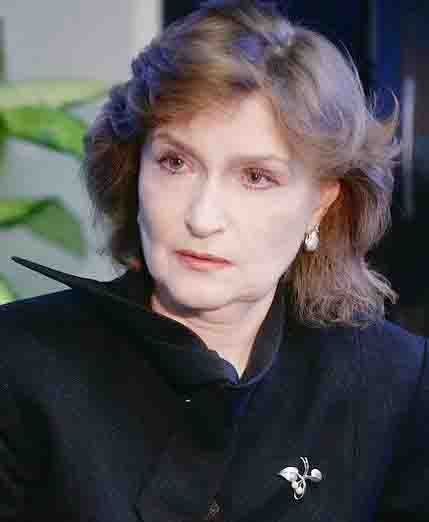
Natalia Narocznickaja (Source: Wikipedia)
On September 2, 2009, during the 22nd International Book Fair in Moscow, a collection of articles edited by N. Narocznickaya and W. Falin, entitled: "The Score of World War II", was presented. Narocznickaya questioned the date of September 1 as the beginning of World War II and accused Poland of holding talks with Adolf Hitler from the beginning of March to the end of August 1939 in order to become his ally. She accused Poland of "starving to death" 100,000 Red Army soldiers captured in 1920 "in the territories occupied by Piłsudski". "They were deliberately not fed, they were watching them as they died." — she claimed.
According to Narocznickaya, Poland presents itself as an absolutely innocent victim. She stated that if there were no Molotov-Ribbentrop pact, Hitler would not attack Poland, and when it comes to Katyn, she said: "It is absolutely unfair that they (the Poles) point out to us Katyn all the time, for which Borys Yeltsin apologized. Not to mention the fact that the Katyn case has not been fully resolved."
Her view that "the organizer of Eastern Europe can only be Russia or Germany" was used in Putin's policy and repeated by him on the German TV ARD on March 6, 2015: "We will not let the past catch us by the sleeve."
Conclusions
Putin's historical narrative is, in fact, an apotheosis of the Stalinist-Soviet story of World War II, ignoring ethnic purges, murders of Polish officers, NKVD barrage troops shooting at anyone who would just think of taking a step back. There is no looting, no mass robbery or rapes of women, no liquidation of the opposition. The purpose of this narrative is one: to purge the Soviet Union and its state leadership — headed by Stalin — of the charges of collaborating with Hitler and of jointly provoking a global conflict. Let us hope that the situations of war crimes committed in Ukraine at the moment will become a comparable testament of what happened during World War II.
In Poland, after the transformations of 1989, the only strategic goals were membership in NATO and the European Union. Almost all issues related to the attitude to the past appear in the Polish public space and are discussed there mainly by people associated with the political environment. Most of these debates take place on the internet and some media. However, the political struggle between the most important groups turns this debate more pronounced, which makes it impossible to carry out an effective cross-party Polish state strategy in this regard.
Scientific research has been conducted for many years, but scientists do not want to be involved in any Polish-Polish wars and rather avoid publishing the results of these studies. We do not realize that the politicization of debates about Poland is detrimental to the Polish raison d'état, giving Russia and our other opponents room to attack. Research funding leaves much to be desired. Sometimes we look with disbelief at people who have attacked the Polish state in the past who are still financed. The use of tools promoting Polish historical narrative is too small. There is still no transparent message in English. Boring lectures by professors will never be attractive in Western scientific circles. There are no ideas for addressing Polish historical narratives globally in foreign languages. There are also no think-tanks and expert staff that could be invited to Western television, discussion centers and international centers. Over the last decade, no good film about Polish history has been made and there are many topics such as, for example Captain Pilecki, hailed by the liberal New York Times as the greatest hero of the twentieth century. The powerlessness in this regard is terrifying. And there is so much to do.
Translation from Polish by Andrew Woźniewicz.






